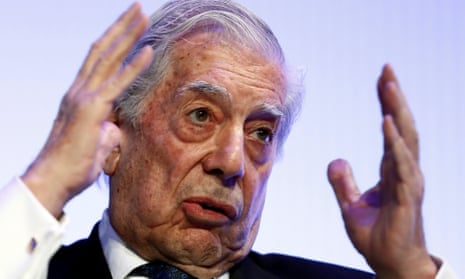Nobel laureate Mario Vargas Llosa has provoked outrage in Mexico by saying that the murder of more than 100 journalists in Mexico over the past decade was due to an expansion of press freedom.
“There is more press freedom in Mexico today than 20 years ago, without doubt,” he said in an interview on Monday.
Twelve journalists were murdered in the country last year, putting it on a par with Syria. Reporters Without Borders ranked Mexico at 147 out of 180 countries on its 2017 World Press Freedom Index.
But Vargas Llosa suggested the deaths were a sign that press freedom was improving. “The fact that more than 100 journalists were murdered is, in grand part, to be blamed on the freedom of the press today, which allows journalists to say things that were not permitted previously. Narcotics trafficking plays an absolutely central part in all of this,” he said.
His comments prompted an immediate and scathing reaction from Mexican reporters. “Not a word of empathy for the victims of the murdered journalists and even less a reflection on crime organised by the powerful,” tweeted Jenaro Villamil, a reporter with the newsweekly Proceso.
Vargas Llosa was also criticised for suggesting that drug traffickers are the main source of violence against Mexico’s press. Organised crime groups have targeted many journalists, but press freedom advocates say public officials often pose more problems for the media than narcotics traffickers.
Politicians and public officials in Mexico have a long history of threatening, intimidating and even ordering attacks on reporters. Last year it was revealed that the country’s government had used spying software to target reporters and activists.
“[He’s] thinking that the main aggressor of journalists in Mexico is organised crime and it’s not like that,” said Javier Garza, former editor of the newspaper El Siglo de Torreón. “The main aggressors of journalists are public officials: government, political parties and public security forces.”
Vargas Llosa’s comments came in an interview with the online radio host Carmen Aristegui, who has herself been forced off air twice after running afoul of the authorities.
It was not the first time that Vargas Llosa has made headlines with recent remarks. In a Sunday column in the Spanish newspaper El País, he blasted feminism as “the most determined enemy of literature, which seeks to decontaminate it of machismo, multiple prejudices and immoralities”.
Last month, he admonished Mexicans not to commit “democratic suicide” by voting for the leftwing populist – and current frontrunner – Andrés Manuel López Obrador in the country’s 1 July presidential election.
López Obrador – who has tapped a vein of deep discontent over corruption, violence and disgust with the political class – currently leads polls by double digits.
But Vargas Llosa has compared him to Hugo Chávez and warned that Mexico risks the same ruin as Venezuela.
López Obrador responded by calling Vargas Llosa – who mounted an unsuccessful campaign for the presidency of Peru – as “a good writer, but a bad politician”.
